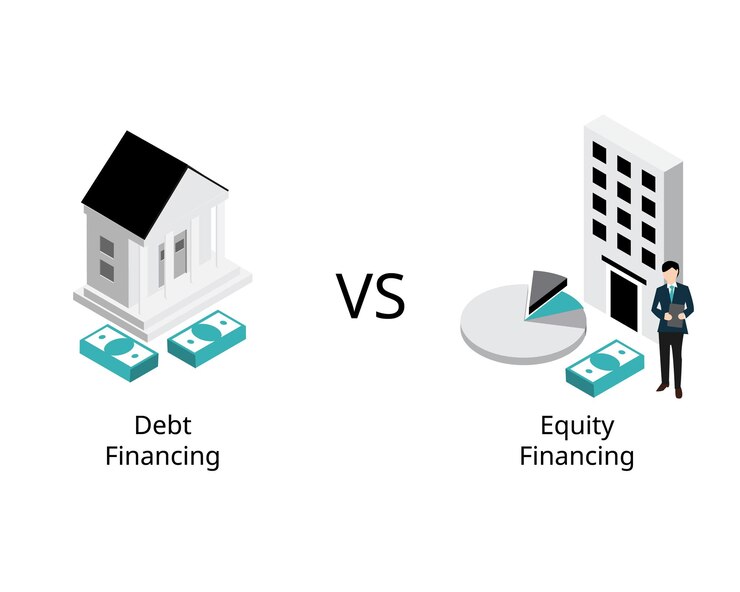
Introduction
When it comes to financing a business, two of the most common options are equity finance and debt finance. Each of these methods offers distinct advantages and challenges, and the choice between them can significantly impact the business’s financial health, growth potential, and control structure. Understanding the differences, benefits, and potential risks of both equity and debt financing is crucial for business owners and financial decision-makers in 2024. This article provides an in-depth analysis of both types of finance, helping you choose the right path for your business’s needs and growth trajectory.
What is Equity Finance?
Equity finance involves raising capital by selling shares of your business to investors. In return for their investment, shareholders gain ownership in the business, entitling them to a share of the company’s profits (dividends) and sometimes voting rights on key business decisions.
Key Features of Equity Finance:
- Ownership Sharing: Investors become part-owners of the company.
- NoDebtObligations: Since equity doesn’t require repayment, businesses aren’t burdened with regular interest payments.
- Long-TermInvestment: Investors typically look for long-term returns through capital growth rather than immediate profits.
- DilutionofControl: By issuing shares, owners may relinquish a portion of their control over the business.
What is Debt Finance?
Debt finance involves borrowing money from lenders or financial institutions with the agreement to repay the principal amount along with interest over a specific period. This can be done through loans, bonds, or other credit instruments.
Key Features of Debt Finance:
- Fixed Repayment Schedule: Debt requires regular repayments, often with a fixed interest rate, regardless of business performance.
- FullControl: Unlike equity, debt financing allows business owners to retain full control of the company.
- TaxBenefits: Interest payments on debt can often be tax-deductible, providing some financial relief to the business.
- PotentialRiskofOver-leverage: Accumulating too much debt can put a strain on cash flow and increase the risk of insolvency if the business cannot meet its repayment obligations.
Comparing Equity Finance and Debt Finance
Now that we’ve outlined the key features of each financing method, let’s compare them in terms of various business factors:
1. Cost of Capital:
Equity finance is often seen as more expensive than debt finance because it involves giving away a portion of the company’s ownership and future profits. On the other hand, debt finance requires regular interest payments, but the business retains its ownership and profits.
2. Control and Ownership:
With equity financing, the business owner sacrifices some control, as investors become shareholders with voting rights. Debt financing, however, allows owners to maintain complete control, as lenders do not have ownership stakes in the company.
3. Risk and Liability:
Debt financing carries the risk of repayment obligations regardless of the business’s performance, increasing the chance of financial strain or bankruptcy if cash flow becomes tight. Equity finance does not require repayment, reducing financial stress, but the risk lies in diluting ownership and potentially losing control over key business decisions.
4. Profit Distribution:
In equity financing, profits are shared with investors in the form of dividends. In contrast, debt financing allows the owner to retain all profits once the debt and interest payments are made.
5. Access to Capital:
Equity financing is often more accessible for early-stage or high-growth businesses without substantial assets or a credit history, as investors are willing to take on more risk for potential high returns. Debt financing, however, typically requires a strong credit history, collateral, or proven financial performance to secure favorable loan terms.
Advantages and Disadvantages of Equity Finance
Advantages:
- No Repayment Pressure: One of the biggest benefits of equity financing is that it doesn’t burden the business with loan repayments, allowing the company to focus on growth.
- AttractiveforStartups: Equity financing can be more accessible to startups and small businesses that don’t have enough assets or cash flow to secure loans.
- AccesstoExpertiseandNetworks: Many equity investors bring valuable industry experience and networks, providing guidance and potential opportunities for the business.
Disadvantages:
- Dilution of Ownership: Raising equity capital results in a loss of ownership and control over the company. In some cases, investors may have significant influence over strategic decisions.
- ExpensiveintheLongRun: While there is no obligation to repay equity, giving away a share of future profits can ultimately cost more than debt finance.
- PotentialConflicts: Differences in vision between business owners and investors can lead to conflicts over the direction of the company.
Advantages and Disadvantages of Debt Finance
Advantages:
- Retained Ownership: With debt financing, business owners retain full control over the company’s decisions and profits.
- Tax Benefits: Interest on debt is often tax-deductible, reducing the overall cost of borrowing.
- Predictable Repayment: Debt financing typically comes with a clear repayment schedule, making it easier for businesses to plan their finances.
Disadvantages:
- Repayment Obligations: Unlike equity, debt financing requires fixed repayments, regardless of the company’s financial performance. Failure to meet these obligations could result in bankruptcy.
- CollateralRequirements: Many lenders require assets as collateral, which can put additional pressure on the business.
- LimitedFlexibility: High levels of debt can limit the company’s financial flexibility, making it harder to secure additional funding or reinvest in the business.
When to Choose Equity Finance
Equity finance is often the better option for businesses that:
- Are in the early stages and need substantial capital for growth.
- Lack the credit history or collateral to secure debt financing.
- Want to avoid the financial strain of regular repayments.
- Are open to sharing control and profits with investors who can contribute expertise and resources.
When to Choose Debt Finance
Debt finance may be more suitable for businesses that:
- Have established cash flows and can comfortably meet repayment schedules.
- Want to retain complete ownership and control over the company.
- Are seeking to finance short-term projects or investments that will quickly generate returns.
- Can take advantage of tax benefits from interest payments.
Conclusion: Which Path is Right for Your Business?
The choice between equity and debt finance depends on your business’s specific needs, goals, and financial situation. Equity finance can be a lifeline for startups and high-growth companies, providing access to large amounts of capital without immediate financial burden. However, it comes at the cost of sharing ownership and profits. Debt finance, while cheaper in the long run and more suitable for businesses that want to maintain control, introduces repayment risks and potential strain on cash flow. For businesses in the UK and globally, understanding these options is essential to making informed financial decisions in 2024 and beyond.









